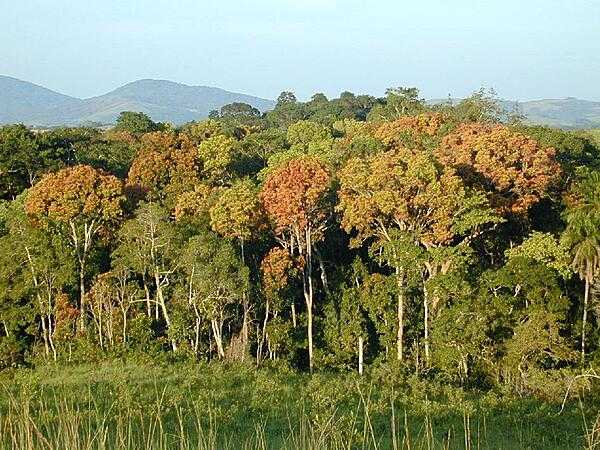Gabon - GA - GAB - GAB - Africa
Last updated: January 05, 2026
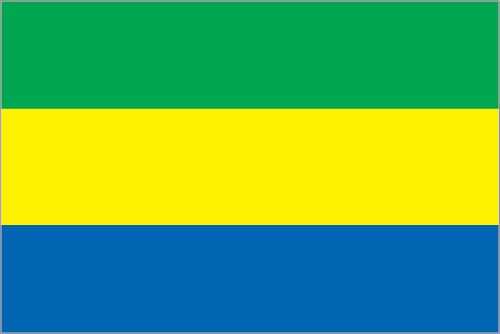
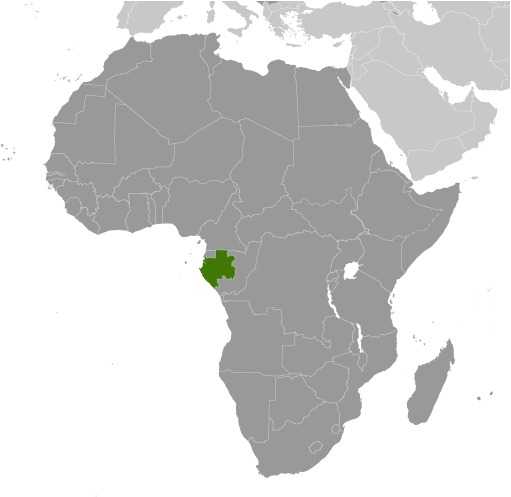
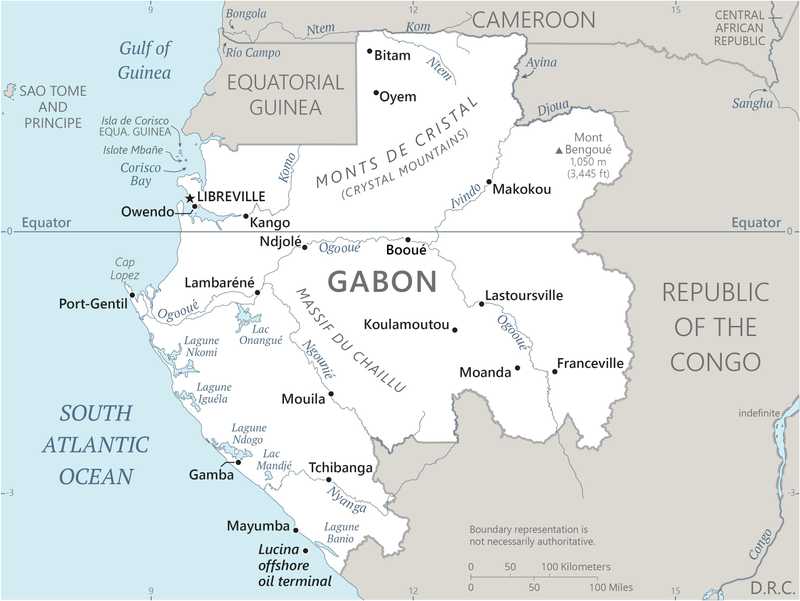
Gabon Images
Gabon Factbook Data
Diplomatic representation from the US
chief of mission: Ambassador Vernelle Trim FITZPATRICK (since 26 January 2024); note - also accredited to Sao Tome and Principe
embassy: Sabliere, B.P. 4000, Libreville
mailing address: 2270 Libreville Place, Washington, DC 20521-2270
telephone: [241] 011-45-71-00
FAX: [241] 011-45-71-05
email address and website:
ACSLibreville@state.gov
https://ga.usembassy.gov/
embassy: Sabliere, B.P. 4000, Libreville
mailing address: 2270 Libreville Place, Washington, DC 20521-2270
telephone: [241] 011-45-71-00
FAX: [241] 011-45-71-05
email address and website:
ACSLibreville@state.gov
https://ga.usembassy.gov/
Age structure
0-14 years: 34.6% (male 429,133/female 421,120)
15-64 years: 61.1% (male 787,480/female 711,913)
65 years and over: 4.3% (2024 est.) (male 53,410/female 52,049)
15-64 years: 61.1% (male 787,480/female 711,913)
65 years and over: 4.3% (2024 est.) (male 53,410/female 52,049)
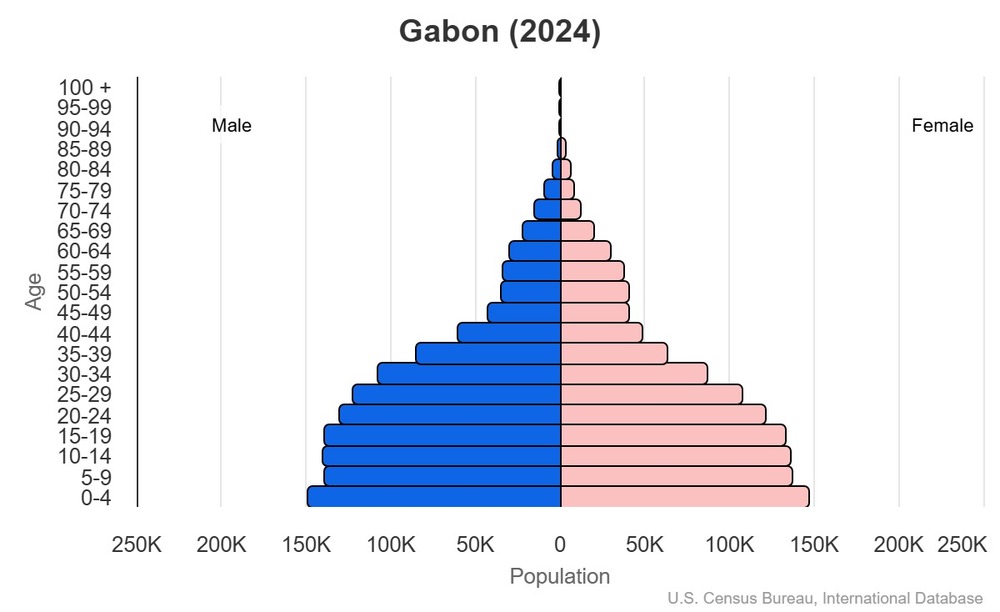
This is the population pyramid for Gabon. A population pyramid illustrates the age and sex structure of a country's population and may provide insights about political and social stability, as well as economic development. The population is distributed along the horizontal axis, with males shown on the left and females on the right. The male and female populations are broken down into 5-year age groups represented as horizontal bars along the vertical axis, with the youngest age groups at the bottom and the oldest at the top. The shape of the population pyramid gradually evolves over time based on fertility, mortality, and international migration trends.
For additional information, please see the entry for Population pyramid on the Definitions and Notes page.
For additional information, please see the entry for Population pyramid on the Definitions and Notes page.
Geographic coordinates
1 00 S, 11 45 E
Sex ratio
at birth: 1.03 male(s)/female
0-14 years: 1.02 male(s)/female
15-64 years: 1.11 male(s)/female
65 years and over: 1.03 male(s)/female
total population: 1.07 male(s)/female (2024 est.)
0-14 years: 1.02 male(s)/female
15-64 years: 1.11 male(s)/female
65 years and over: 1.03 male(s)/female
total population: 1.07 male(s)/female (2024 est.)
Natural hazards
none
Area - comparative
slightly smaller than Colorado
Background
Gabon, a sparsely populated country known for its dense rainforests and vast petroleum reserves, is one of the most prosperous and stable countries in central Africa. Approximately 40 ethnic groups are represented, the largest of which is the Fang, a group that covers the northern third of Gabon and expands north into Equatorial Guinea and Cameroon. From about the early 1300s, various kingdoms emerged in present-day Gabon and the surrounding area, including the Kingdoms of Loango and Orungu. Because most early Bantu languages spoken in these kingdoms did not have a written form, much of Gabon's early history was lost over time. Portuguese traders who arrived in the mid-1400s gave the area its name of Gabon. At that time, indigenous trade networks began to engage with European traders, exchanging goods such as ivory and wood. For a century beginning in the 1760s, trade came to focus mostly on enslaved people. While many groups in Gabon participated in the slave trade, the Fang were a notable exception. As the slave trade declined in the late 1800s, France colonized the country and directed a widespread extraction of Gabonese resources. Anti-colonial rhetoric by Gabon’s educated elites increased significantly in the early 1900s, but no widespread rebellion materialized. French decolonization after World War II led to the country’s independence in 1960.
Within a year of independence, the government changed from a parliamentary to a presidential system, and Leon M’BA won the first presidential election in 1961. El Hadj Omar BONGO Ondimba was M’BA’s vice president and assumed the presidency after M’BA’s death in 1967. BONGO went on to dominate the country's political scene for four decades (1967-2009). In 1968, he declared Gabon a single-party state and created the still-dominant Parti Democratique Gabonais (PDG). In the early 1990s, he reintroduced a multiparty system under a new constitution in response to growing political opposition. He was reelected by wide margins in 1995, 1998, 2002, and 2005 against a divided opposition and amidst allegations of fraud. After BONGO's death in 2009, a new election brought his son, Ali BONGO Ondimba, to power, and he was reelected in 2016. He won a third term in the August 2023 election but was overthrown in a military coup a few days later. Gen. Brice OLIGUI Nguema led a military group called the Committee for the Transition and Restoration of Institutions that arrested BONGO, canceled the election results, and dissolved state institutions. In September 2023, OLIGUI was sworn in as transitional president of Gabon.
Within a year of independence, the government changed from a parliamentary to a presidential system, and Leon M’BA won the first presidential election in 1961. El Hadj Omar BONGO Ondimba was M’BA’s vice president and assumed the presidency after M’BA’s death in 1967. BONGO went on to dominate the country's political scene for four decades (1967-2009). In 1968, he declared Gabon a single-party state and created the still-dominant Parti Democratique Gabonais (PDG). In the early 1990s, he reintroduced a multiparty system under a new constitution in response to growing political opposition. He was reelected by wide margins in 1995, 1998, 2002, and 2005 against a divided opposition and amidst allegations of fraud. After BONGO's death in 2009, a new election brought his son, Ali BONGO Ondimba, to power, and he was reelected in 2016. He won a third term in the August 2023 election but was overthrown in a military coup a few days later. Gen. Brice OLIGUI Nguema led a military group called the Committee for the Transition and Restoration of Institutions that arrested BONGO, canceled the election results, and dissolved state institutions. In September 2023, OLIGUI was sworn in as transitional president of Gabon.
Environmental issues
deforestation from logging; solid-waste disposal; water pollution from oil industry; wildlife poaching
International environmental agreements
party to: Biodiversity, Climate Change, Climate Change-Kyoto Protocol, Climate Change-Paris Agreement, Comprehensive Nuclear Test Ban, Desertification, Endangered Species, Hazardous Wastes, Law of the Sea, Marine Dumping-London Convention, Nuclear Test Ban, Ozone Layer Protection, Ship Pollution, Tropical Timber 2006, Wetlands, Whaling
signed, but not ratified: none of the selected agreements
signed, but not ratified: none of the selected agreements
Military expenditures
1.5% of GDP (2024 est.)
1.3% of GDP (2023 est.)
1.3% of GDP (2022 est.)
1.7% of GDP (2021 est.)
1.8% of GDP (2020 est.)
1.3% of GDP (2023 est.)
1.3% of GDP (2022 est.)
1.7% of GDP (2021 est.)
1.8% of GDP (2020 est.)
Population below poverty line
33.4% (2017 est.)
note: % of population with income below national poverty line
note: % of population with income below national poverty line
Household income or consumption by percentage share
lowest 10%: 2.2% (2017 est.)
highest 10%: 27.7% (2017 est.)
note: % share of income accruing to lowest and highest 10% of population
highest 10%: 27.7% (2017 est.)
note: % share of income accruing to lowest and highest 10% of population
Exports - commodities
crude petroleum, ships, manganese ore, refined petroleum, wood (2023)
note: top five export commodities based on value in dollars
note: top five export commodities based on value in dollars
Exports - partners
China 26%, Indonesia 8%, Spain 7%, Israel 6%, Congo, Republic of the 5% (2023)
note: top five export partners based on percentage share of exports
note: top five export partners based on percentage share of exports
Administrative divisions
9 provinces; Estuaire, Haut-Ogooue, Moyen-Ogooue, Ngounie, Nyanga, Ogooue-Ivindo, Ogooue-Lolo, Ogooue-Maritime, Woleu-Ntem
Agricultural products
oil palm fruit, plantains, cassava, sugarcane, yams, taro, vegetables, maize, groundnuts, game meat (2023)
note: top ten agricultural products based on tonnage
note: top ten agricultural products based on tonnage
Budget
revenues: $2.939 billion (2021 est.)
expenditures: $3.226 billion (2021 est.)
note: central government revenues and expenses (excluding grants/extrabudgetary units/social security funds) converted to US dollars at average official exchange rate for year indicated
expenditures: $3.226 billion (2021 est.)
note: central government revenues and expenses (excluding grants/extrabudgetary units/social security funds) converted to US dollars at average official exchange rate for year indicated
Capital
name: Libreville
geographic coordinates: 0 23 N, 9 27 E
time difference: UTC+1 (6 hours ahead of Washington, DC, during Standard Time)
etymology: the city was founded in 1849 by freed slaves, and the name means "free town" in French
geographic coordinates: 0 23 N, 9 27 E
time difference: UTC+1 (6 hours ahead of Washington, DC, during Standard Time)
etymology: the city was founded in 1849 by freed slaves, and the name means "free town" in French
Imports - commodities
ships, refined petroleum, iron pipes, cars, packaged medicine (2023)
note: top five import commodities based on value in dollars
note: top five import commodities based on value in dollars
Climate
tropical; always hot, humid
Coastline
885 km
Constitution
history: previous 1961, 1991; latest approved in November 2024 referendum
amendment process: proposed by the president of the republic, by the Council of Ministers, or by one third of either house of Parliament; passage requires Constitutional Court evaluation, at least two-thirds majority vote of two thirds of the Parliament membership convened in joint session, and approval in a referendum; constitutional articles on Gabon’s democratic form of government cannot be amended
amendment process: proposed by the president of the republic, by the Council of Ministers, or by one third of either house of Parliament; passage requires Constitutional Court evaluation, at least two-thirds majority vote of two thirds of the Parliament membership convened in joint session, and approval in a referendum; constitutional articles on Gabon’s democratic form of government cannot be amended
Exchange rates
Coopération Financière en Afrique Centrale francs (XAF) per US dollar -
Exchange rates:
606.345 (2024 est.)
606.57 (2023 est.)
623.76 (2022 est.)
554.531 (2021 est.)
575.586 (2020 est.)
Exchange rates:
606.345 (2024 est.)
606.57 (2023 est.)
623.76 (2022 est.)
554.531 (2021 est.)
575.586 (2020 est.)
Executive branch
chief of state: President Brice OLIGUI Nguema (since 3 May 2025)
head of government: President Brice OLIGUI Nguema (since 3 May 2025)
cabinet: cabinet appointed by president
election/appointment process: the president directly elected by plurality vote to a 7-year term (no term limits)
most recent election date: 12 April 2025
election results:
2025: Brice OLIGUI Nguema elected president; percent of vote - Brice OLIGUI Nguema (Ind.) 90.35%, Alain Claude Bilie By Nze (EPG) 3.02%, other 6.63%
2016: Ali BONGO Ondimba reelected president; percent of vote - Ali BONGO Ondimba (PDG) 49.8%, Jean PING (UFC) 48.2%, other 2.0%
head of government: President Brice OLIGUI Nguema (since 3 May 2025)
cabinet: cabinet appointed by president
election/appointment process: the president directly elected by plurality vote to a 7-year term (no term limits)
most recent election date: 12 April 2025
election results:
2025: Brice OLIGUI Nguema elected president; percent of vote - Brice OLIGUI Nguema (Ind.) 90.35%, Alain Claude Bilie By Nze (EPG) 3.02%, other 6.63%
2016: Ali BONGO Ondimba reelected president; percent of vote - Ali BONGO Ondimba (PDG) 49.8%, Jean PING (UFC) 48.2%, other 2.0%
Flag
description: three equal horizontal bands of green (top), yellow, and blue
meaning: green stands for the country's forests and natural resources, gold for the equator and the sun, and blue for the sea
meaning: green stands for the country's forests and natural resources, gold for the equator and the sun, and blue for the sea
Independence
17 August 1960 (from France)
Industries
petroleum extraction and refining; manganese, gold; chemicals, ship repair, food and beverages, textiles, lumbering and plywood, cement
Judicial branch
highest court(s): Supreme Court (consists of 4 permanent specialized supreme courts - Supreme Court or Cour de Cassation, Administrative Supreme Court or Conseil d'Etat, Accounting Supreme Court or Cour des Comptes, Constitutional Court or Cour Constitutionnelle, and the non-permanent Court of State Security, initiated only for cases of high treason by the president and criminal activity by executive branch officials)
judge selection and term of office: appointment and tenure of Supreme, Administrative, Accounting, and State Security courts NA; Constitutional Court judges appointed - 3 by the national president, 3 by the president of the Senate, and 3 by the president of the National Assembly; judges serve single renewable 7-year terms
subordinate courts: Courts of Appeal; county courts; military courts
judge selection and term of office: appointment and tenure of Supreme, Administrative, Accounting, and State Security courts NA; Constitutional Court judges appointed - 3 by the national president, 3 by the president of the Senate, and 3 by the president of the National Assembly; judges serve single renewable 7-year terms
subordinate courts: Courts of Appeal; county courts; military courts
Land boundaries
total: 3,261 km
border countries (3): Cameroon 349 km; Republic of the Congo 2,567 km; Equatorial Guinea 345 km
border countries (3): Cameroon 349 km; Republic of the Congo 2,567 km; Equatorial Guinea 345 km
Land use
agricultural land: 8.4% (2023 est.)
arable land: 1.3% (2023 est.)
permanent crops: 0.7% (2023 est.)
permanent pasture: 6.4% (2023 est.)
forest: 91.5% (2023 est.)
other: 0.2% (2023 est.)
arable land: 1.3% (2023 est.)
permanent crops: 0.7% (2023 est.)
permanent pasture: 6.4% (2023 est.)
forest: 91.5% (2023 est.)
other: 0.2% (2023 est.)
Legal system
mixed system of French civil law and customary law
Legislative branch
legislature name: Parliament
legislative structure: bicameral
legislative structure: bicameral
Literacy
total population: 88.9% (2021 est.)
male: 90.8% (2021 est.)
female: 87.1% (2021 est.)
male: 90.8% (2021 est.)
female: 87.1% (2021 est.)
Maritime claims
territorial sea: 12 nm
contiguous zone: 24 nm
exclusive economic zone: 200 nm
contiguous zone: 24 nm
exclusive economic zone: 200 nm
International organization participation
ACP, AfDB, AU (suspended), BDEAC, CEMAC, FAO, FZ, G-24, G-77, IAEA, IBRD, ICAO, ICCt, ICRM, IDA, IDB, IFAD, IFC, IFRCS, ILO, IMF, IMO, IMSO, Interpol, IOC, IOM, IPU, ISO, ITSO, ITU, ITUC (NGOs), MIGA, MINUSCA, NAM, OIC, OIF, OPCW, UN, UNCTAD, UNESCO, UNIDO, UNWTO, UPU, WCO, WHO, WIPO, WMO, WTO
National holiday
Independence Day, 17 August (1960)
Nationality
noun: Gabonese (singular and plural)
adjective: Gabonese
adjective: Gabonese
Natural resources
petroleum, natural gas, diamond, niobium, manganese, uranium, gold, timber, iron ore, hydropower
Geography - note
the country has maintained its pristine rain forest and rich biodiversity
Economic overview
natural-resource-rich, upper-middle-income, Central African economy; significant reliance on oil and mineral exports; highly urbanized population; high levels of poverty and unemployment; uncertainty on institutional and development reform progress following 2023 military coup
Political parties
Gabonese Democratic Party or PDG
Restoration of Republican Values or RV
The Democrats or LD
Paul Mba Abessole
Restoration of Republican Values or RV
The Democrats or LD
Paul Mba Abessole
Railways
total: 649 km (2014)
standard gauge: 649 km (2014) 1.435-m gauge
standard gauge: 649 km (2014) 1.435-m gauge
Suffrage
18 years of age; universal
Terrain
narrow coastal plain; hilly interior; savanna in east and south
Government type
presidential republic
Country name
conventional long form: Gabonese Republic
conventional short form: Gabon
local long form: République Gabonaise
local short form: Gabon
etymology: name originates from the Portuguese word gabão, meaning "cloak," possibly used by early explorers to describe the shape of the Komo River estuary
conventional short form: Gabon
local long form: République Gabonaise
local short form: Gabon
etymology: name originates from the Portuguese word gabão, meaning "cloak," possibly used by early explorers to describe the shape of the Komo River estuary
Location
Central Africa, bordering the Atlantic Ocean at the Equator, between Republic of the Congo and Equatorial Guinea
Map references
Africa
Irrigated land
40 sq km (2012)
Diplomatic representation in the US
chief of mission: Ambassador Noël Nelson MESSONE (12 December 2022)
chancery: 2034 20th Street NW, Suite 200, Washington, DC 20009
telephone: [1] (202) 797-1000
FAX: [1] (301) 332-0668
email address and website:
info@gaboneembassyusa.org
https://gabonembassyusa.org/en/
consulate(s) general: New York
chancery: 2034 20th Street NW, Suite 200, Washington, DC 20009
telephone: [1] (202) 797-1000
FAX: [1] (301) 332-0668
email address and website:
info@gaboneembassyusa.org
https://gabonembassyusa.org/en/
consulate(s) general: New York
Internet users
percent of population: 72% (2023 est.)
Internet country code
.ga
GDP (official exchange rate)
$20.867 billion (2024 est.)
note: data in current dollars at official exchange rate
note: data in current dollars at official exchange rate
Total renewable water resources
166 billion cubic meters (2022 est.)
Urbanization
urban population: 91% of total population (2023)
rate of urbanization: 2.27% annual rate of change (2020-25 est.)
rate of urbanization: 2.27% annual rate of change (2020-25 est.)
Broadcast media
2 state-run TV stations and 2 state-run radio stations; a few private radio and TV stations; transmissions of at least 2 international broadcasters are accessible; satellite service subscriptions are available
Drinking water source
improved:
urban: 90.2% of population (2022 est.)
rural: 54.9% of population (2022 est.)
total: 86.9% of population (2022 est.)
unimproved:
urban: 9.8% of population (2022 est.)
rural: 45.1% of population (2022 est.)
total: 13.1% of population (2022 est.)
urban: 90.2% of population (2022 est.)
rural: 54.9% of population (2022 est.)
total: 86.9% of population (2022 est.)
unimproved:
urban: 9.8% of population (2022 est.)
rural: 45.1% of population (2022 est.)
total: 13.1% of population (2022 est.)
National anthem(s)
title: "La Concorde" (The Concorde)
lyrics/music: Georges Aleka DAMAS
history: adopted 1960
lyrics/music: Georges Aleka DAMAS
history: adopted 1960
This is an audio of the National Anthem for Gabon. The national anthem is generally a patriotic musical composition - usually in the form of a song or hymn of praise - that evokes and eulogizes the history, traditions, or struggles of a nation or its people. National anthems can be officially recognized as a national song by a country's constitution or by an enacted law, or simply by tradition. Although most anthems contain lyrics, some do not.
Major urban areas - population
870,000 LIBREVILLE (capital) (2023)
International law organization participation
has not submitted an ICJ jurisdiction declaration; accepts ICCt jurisdiction
Physician density
0.52 physicians/1,000 population (2022)
National symbol(s)
black panther
Mother's mean age at first birth
19.6 years (2012 est.)
note: data represents median age at first birth among women 20-49
note: data represents median age at first birth among women 20-49
GDP - composition, by end use
household consumption: 33.7% (2024 est.)
government consumption: 12.2% (2024 est.)
investment in fixed capital: 18.1% (2024 est.)
investment in inventories: 0% (2024 est.)
exports of goods and services: 65.3% (2024 est.)
imports of goods and services: -29.2% (2024 est.)
note: figures may not total 100% due to rounding or gaps in data collection
government consumption: 12.2% (2024 est.)
investment in fixed capital: 18.1% (2024 est.)
investment in inventories: 0% (2024 est.)
exports of goods and services: 65.3% (2024 est.)
imports of goods and services: -29.2% (2024 est.)
note: figures may not total 100% due to rounding or gaps in data collection
Dependency ratios
total dependency ratio: 63.7 (2024 est.)
youth dependency ratio: 56.7 (2024 est.)
elderly dependency ratio: 7 (2024 est.)
potential support ratio: 14.2 (2024 est.)
youth dependency ratio: 56.7 (2024 est.)
elderly dependency ratio: 7 (2024 est.)
potential support ratio: 14.2 (2024 est.)
Citizenship
citizenship by birth: no
citizenship by descent only: at least one parent must be a citizen of Gabon
dual citizenship recognized: no
residency requirement for naturalization: 10 years
citizenship by descent only: at least one parent must be a citizen of Gabon
dual citizenship recognized: no
residency requirement for naturalization: 10 years
Population distribution
the relatively small population is spread in pockets throughout the country; the largest urban center is the capital of Libreville, located along the Atlantic coast in the northwest, as shown in this population distribution map
Electricity access
electrification - total population: 93.5% (2022 est.)
electrification - urban areas: 98.5%
electrification - rural areas: 29%
electrification - urban areas: 98.5%
electrification - rural areas: 29%
Civil aircraft registration country code prefix
TR
Sanitation facility access
improved:
urban: 81.3% of population (2022 est.)
rural: 55.1% of population (2022 est.)
total: 78.9% of population (2022 est.)
unimproved:
urban: 18.7% of population (2022 est.)
rural: 44.9% of population (2022 est.)
total: 21.1% of population (2022 est.)
urban: 81.3% of population (2022 est.)
rural: 55.1% of population (2022 est.)
total: 78.9% of population (2022 est.)
unimproved:
urban: 18.7% of population (2022 est.)
rural: 44.9% of population (2022 est.)
total: 21.1% of population (2022 est.)
Ethnic groups
Fang 23.5%, Shira-Punu'Vii 20.6%, Nzabi-Duma 11.2%, Mbede-Teke 5.6%, Myene 4.4%, Kota-Kele 4.3%, Okande-Tsogho 1.6%, other 12.6%, foreigner 16.2% (2021 est.)
Religions
Protestant 46.4% (Revival Church 37%, other Protestant 9.4%), Roman Catholic 29.8%, other Christian 4%, Muslim 10.8%, traditional/animist 1.1%, other 0.9%, none 7% (2019-21 est.)
Languages
French (official), Fang, Myene, Nzebi, Bapounou/Eschira, Bandjabi
Imports - partners
France 14%, China 13%, S. Korea 13%, USA 7%, India 4% (2023)
note: top five import partners based on percentage share of imports
note: top five import partners based on percentage share of imports
Refugees and internally displaced persons
refugees: 261 (2024 est.)
Elevation
highest point: Mont Bengoue 1,050 m
lowest point: Atlantic Ocean 0 m
mean elevation: 377 m
lowest point: Atlantic Ocean 0 m
mean elevation: 377 m
Health expenditure
2.7% of GDP (2021)
9.6% of national budget (2022 est.)
9.6% of national budget (2022 est.)
Military - note
the Gabonese military is a small and lightly armed force that is responsible for both external and internal security; the military may also participate in the economic and social development work of the nation; key defense priorities include securing the country's borders and maritime domain; it has contributed to regional peacekeeping and joint security operations; in August 2023, officers from the Republican Guard seized control of the government and placed the president under arrest (2025)
Military and security service personnel strengths
approximately 7,000 active-duty Armed Forces including the Republican Guard and Gendarmerie (2025)
Total water withdrawal
municipal: 84.7 million cubic meters (2022 est.)
industrial: 14.1 million cubic meters (2022 est.)
agricultural: 40.3 million cubic meters (2022 est.)
industrial: 14.1 million cubic meters (2022 est.)
agricultural: 40.3 million cubic meters (2022 est.)
Waste and recycling
municipal solid waste generated annually: 238,100 tons (2024 est.)
percent of municipal solid waste recycled: 22.4% (2022 est.)
percent of municipal solid waste recycled: 22.4% (2022 est.)
Major aquifers
Congo Basin
Major watersheds (area sq km)
Atlantic Ocean drainage: Congo (3,730,881 sq km)
National heritage
total World Heritage Sites: 2 (1 natural, 1 mixed)
selected World Heritage Site locales: Ecosystem and Relict Cultural Landscape of Lopé-Okanda (m); Ivindo National Park (n)
selected World Heritage Site locales: Ecosystem and Relict Cultural Landscape of Lopé-Okanda (m); Ivindo National Park (n)
Coal
imports: 75,000 metric tons (2023 est.)
Electricity generation sources
fossil fuels: 51.9% of total installed capacity (2023 est.)
hydroelectricity: 47.7% of total installed capacity (2023 est.)
biomass and waste: 0.3% of total installed capacity (2023 est.)
hydroelectricity: 47.7% of total installed capacity (2023 est.)
biomass and waste: 0.3% of total installed capacity (2023 est.)
Natural gas
production: 463 million cubic meters (2023 est.)
consumption: 463 million cubic meters (2023 est.)
proven reserves: 25.995 billion cubic meters (2021 est.)
consumption: 463 million cubic meters (2023 est.)
proven reserves: 25.995 billion cubic meters (2021 est.)
Petroleum
total petroleum production: 204,000 bbl/day (2023 est.)
refined petroleum consumption: 14,000 bbl/day (2023 est.)
crude oil estimated reserves: 2 billion barrels (2021 est.)
refined petroleum consumption: 14,000 bbl/day (2023 est.)
crude oil estimated reserves: 2 billion barrels (2021 est.)
Currently married women (ages 15-49)
48.5% (2020 est.)
Remittances
0.1% of GDP (2023 est.)
0.1% of GDP (2022 est.)
0.1% of GDP (2021 est.)
note: personal transfers and compensation between resident and non-resident individuals/households/entities
0.1% of GDP (2022 est.)
0.1% of GDP (2021 est.)
note: personal transfers and compensation between resident and non-resident individuals/households/entities
Space program overview
has a small space program focused on using data from remote sensing (RS) satellites for environmental and natural-resource management, mapping, land-use planning, maritime surveillance, and research; member of the African Space Agency; has relationships with Brazil, China, the ESA, individual ESA member states (particularly France), and the US, as well as African countries such as Kenya, Niger, Rwanda, and South Africa; shares RS satellite data with neighboring countries (2025)
Space agency/agencies
Gabonese Studies and Space Observations Agency (Agence Gabonaise d’Etudes et d’Observations Spatiales or AGEOS; established 2015) (2025)
Ports
total ports: 9 (2024)
large: 0
medium: 2
small: 2
very small: 5
ports with oil terminals: 7
key ports: Libreville, Oguendjo Terminal, Port Gentil, Port Owendo
large: 0
medium: 2
small: 2
very small: 5
ports with oil terminals: 7
key ports: Libreville, Oguendjo Terminal, Port Gentil, Port Owendo
Child marriage
women married by age 15: 2.9% (2021)
women married by age 18: 13.3% (2021)
men married by age 18: 4.8% (2021)
women married by age 18: 13.3% (2021)
men married by age 18: 4.8% (2021)
Legislative branch - lower chamber
chamber name: National Assembly (Assemblée nationale)
number of seats: 145 (all directly elected)
electoral system: plurality/majority
scope of elections: full renewal
term in office: 5 years
most recent election date: 10/6/2023
percentage of women in chamber: 21.6%
expected date of next election: November 2030
number of seats: 145 (all directly elected)
electoral system: plurality/majority
scope of elections: full renewal
term in office: 5 years
most recent election date: 10/6/2023
percentage of women in chamber: 21.6%
expected date of next election: November 2030
Legislative branch - upper chamber
chamber name: Senate (Senate)
number of seats: 70 (all indirectly elected)
scope of elections: full renewal
term in office: 5 years
most recent election date: 9/27/2025 to 10/11/2025
percentage of women in chamber: 20.3%
expected date of next election: November 2025
number of seats: 70 (all indirectly elected)
scope of elections: full renewal
term in office: 5 years
most recent election date: 9/27/2025 to 10/11/2025
percentage of women in chamber: 20.3%
expected date of next election: November 2025
National coat of arms
the panthers represent vigilance and courage, and they support a shield with a ship and an okoume tree, which is a symbol of the timber trade; the ribbon below the shield has the national motto in French, Union, Travail, Justice ("Union, Work, Justice"), and the ribbon above the shield has the Latin phrase Uniti Progrediemur ("We shall go forward united")
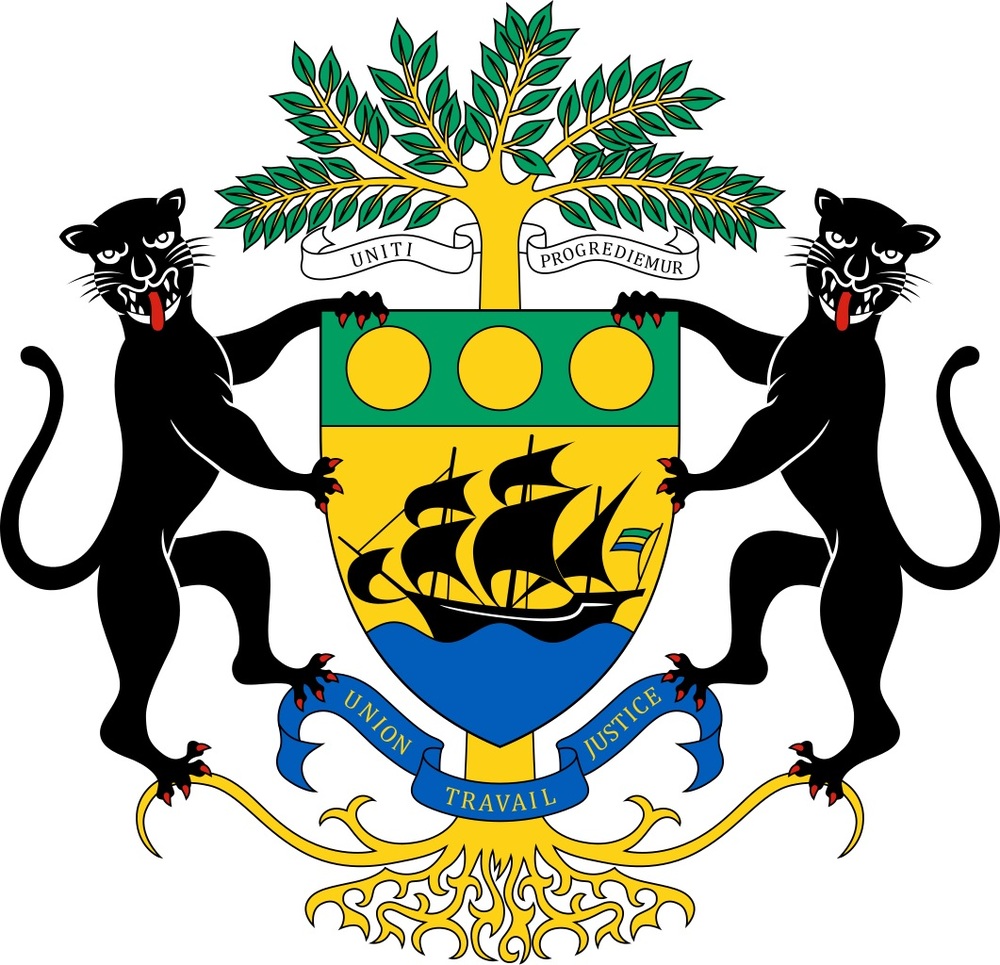
Gabon's coat of arms
National color(s)
green, yellow, blue
Particulate matter emissions
29.6 micrograms per cubic meter (2019 est.)
Key space-program milestones
1986 - ESA established a ground station in Gabon
2018 - completed mapping Gabon’s forests
2019 - founding member of the Space Climate Observatory
2021 - began acquisition process for first satellite in joint project with Japan, known as BIRDs
2025 - became member of new African Space Agency
2018 - completed mapping Gabon’s forests
2019 - founding member of the Space Climate Observatory
2021 - began acquisition process for first satellite in joint project with Japan, known as BIRDs
2025 - became member of new African Space Agency
Methane emissions
energy: 272.4 kt (2022-2024 est.)
agriculture: 4.9 kt (2019-2021 est.)
waste: 18.6 kt (2019-2021 est.)
other: 5.4 kt (2019-2021 est.)
agriculture: 4.9 kt (2019-2021 est.)
waste: 18.6 kt (2019-2021 est.)
other: 5.4 kt (2019-2021 est.)
Labor force
824,400 (2024 est.)
note: number of people ages 15 or older who are employed or seeking work
note: number of people ages 15 or older who are employed or seeking work
Youth unemployment rate (ages 15-24)
total: 36% (2024 est.)
male: 31.1% (2024 est.)
female: 42.3% (2024 est.)
note: % of labor force ages 15-24 seeking employment
male: 31.1% (2024 est.)
female: 42.3% (2024 est.)
note: % of labor force ages 15-24 seeking employment
Debt - external
$6.442 billion (2023 est.)
note: present value of external debt in current US dollars
note: present value of external debt in current US dollars
Maternal mortality ratio
233 deaths/100,000 live births (2023 est.)
Reserves of foreign exchange and gold
$1.447 billion (2023 est.)
$1.415 billion (2022 est.)
$1.304 billion (2021 est.)
note: holdings of gold (year-end prices)/foreign exchange/special drawing rights in current dollars
$1.415 billion (2022 est.)
$1.304 billion (2021 est.)
note: holdings of gold (year-end prices)/foreign exchange/special drawing rights in current dollars
Unemployment rate
20.1% (2024 est.)
20.3% (2023 est.)
20.4% (2022 est.)
note: % of labor force seeking employment
20.3% (2023 est.)
20.4% (2022 est.)
note: % of labor force seeking employment
Population
total: 2,455,105 (2024 est.)
male: 1,270,023
female: 1,185,082
male: 1,270,023
female: 1,185,082
Carbon dioxide emissions
3.144 million metric tonnes of CO2 (2023 est.)
from coal and metallurgical coke: 230,000 metric tonnes of CO2 (2023 est.)
from petroleum and other liquids: 2.005 million metric tonnes of CO2 (2023 est.)
from consumed natural gas: 908,000 metric tonnes of CO2 (2023 est.)
from coal and metallurgical coke: 230,000 metric tonnes of CO2 (2023 est.)
from petroleum and other liquids: 2.005 million metric tonnes of CO2 (2023 est.)
from consumed natural gas: 908,000 metric tonnes of CO2 (2023 est.)
Area
total : 267,667 sq km
land: 257,667 sq km
water: 10,000 sq km
land: 257,667 sq km
water: 10,000 sq km
Taxes and other revenues
9.5% (of GDP) (2021 est.)
note: central government tax revenue as a % of GDP
note: central government tax revenue as a % of GDP
Real GDP (purchasing power parity)
$48.045 billion (2024 est.)
$46.472 billion (2023 est.)
$45.363 billion (2022 est.)
note: data in 2021 dollars
$46.472 billion (2023 est.)
$45.363 billion (2022 est.)
note: data in 2021 dollars
Airports
42 (2025)
Telephones - mobile cellular
total subscriptions: 3 million (2022 est.)
subscriptions per 100 inhabitants: 125 (2022 est.)
subscriptions per 100 inhabitants: 125 (2022 est.)
Gini Index coefficient - distribution of family income
38 (2017 est.)
note: index (0-100) of income distribution; higher values represent greater inequality
note: index (0-100) of income distribution; higher values represent greater inequality
Inflation rate (consumer prices)
1.2% (2024 est.)
3.6% (2023 est.)
4.2% (2022 est.)
note: annual % change based on consumer prices
3.6% (2023 est.)
4.2% (2022 est.)
note: annual % change based on consumer prices
Current account balance
$140.996 million (2015 est.)
$1.112 billion (2014 est.)
$1.463 billion (2013 est.)
note: balance of payments - net trade and primary/secondary income in current dollars
$1.112 billion (2014 est.)
$1.463 billion (2013 est.)
note: balance of payments - net trade and primary/secondary income in current dollars
Real GDP per capita
$18,900 (2024 est.)
$18,700 (2023 est.)
$18,700 (2022 est.)
note: data in 2021 dollars
$18,700 (2023 est.)
$18,700 (2022 est.)
note: data in 2021 dollars
Broadband - fixed subscriptions
total: 80,000 (2022 est.)
subscriptions per 100 inhabitants: 3 (2022 est.)
subscriptions per 100 inhabitants: 3 (2022 est.)
Obesity - adult prevalence rate
15% (2016)
Energy consumption per capita
22.101 million Btu/person (2023 est.)
Electricity
installed generating capacity: 785,000 kW (2023 est.)
consumption: 3.173 billion kWh (2023 est.)
imports: 584.039 million kWh (2023 est.)
transmission/distribution losses: 604 million kWh (2023 est.)
consumption: 3.173 billion kWh (2023 est.)
imports: 584.039 million kWh (2023 est.)
transmission/distribution losses: 604 million kWh (2023 est.)
Merchant marine
total: 87 (2023)
by type: bulk carrier 1, general cargo 19, oil tanker 30, other 37
by type: bulk carrier 1, general cargo 19, oil tanker 30, other 37
Children under the age of 5 years underweight
5.4% (2020 est.)
Imports
$6.094 billion (2024 est.)
$5.38 billion (2023 est.)
$5.005 billion (2022 est.)
note: GDP expenditure basis - imports of goods and services in current dollars
$5.38 billion (2023 est.)
$5.005 billion (2022 est.)
note: GDP expenditure basis - imports of goods and services in current dollars
Exports
$13.622 billion (2024 est.)
$12.869 billion (2023 est.)
$13.814 billion (2022 est.)
note: GDP expenditure basis - exports of goods and services in current dollars
$12.869 billion (2023 est.)
$13.814 billion (2022 est.)
note: GDP expenditure basis - exports of goods and services in current dollars
Telephones - fixed lines
total subscriptions: 43,000 (2022 est.)
subscriptions per 100 inhabitants: 2 (2022 est.)
subscriptions per 100 inhabitants: 2 (2022 est.)
Alcohol consumption per capita
total: 6.47 liters of pure alcohol (2019 est.)
beer: 5.31 liters of pure alcohol (2019 est.)
wine: 0.62 liters of pure alcohol (2019 est.)
spirits: 0.5 liters of pure alcohol (2019 est.)
other alcohols: 0.04 liters of pure alcohol (2019 est.)
beer: 5.31 liters of pure alcohol (2019 est.)
wine: 0.62 liters of pure alcohol (2019 est.)
spirits: 0.5 liters of pure alcohol (2019 est.)
other alcohols: 0.04 liters of pure alcohol (2019 est.)
Life expectancy at birth
total population: 70.4 years (2024 est.)
male: 68.6 years
female: 72.1 years
male: 68.6 years
female: 72.1 years
Real GDP growth rate
3.4% (2024 est.)
2.4% (2023 est.)
3% (2022 est.)
note: annual GDP % growth based on constant local currency
2.4% (2023 est.)
3% (2022 est.)
note: annual GDP % growth based on constant local currency
Industrial production growth rate
2.8% (2024 est.)
note: annual % change in industrial value added based on constant local currency
note: annual % change in industrial value added based on constant local currency
GDP - composition, by sector of origin
agriculture: 6.2% (2024 est.)
industry: 50.9% (2024 est.)
services: 37.5% (2024 est.)
note: figures may not total 100% due to non-allocated consumption not captured in sector-reported data
industry: 50.9% (2024 est.)
services: 37.5% (2024 est.)
note: figures may not total 100% due to non-allocated consumption not captured in sector-reported data
Education expenditure
2.3% of GDP (2023 est.)
13.6% national budget (2023 est.)
13.6% national budget (2023 est.)
Military equipment inventories and acquisitions
the Gabonese military has a mix of older and limited quantities of more modern armaments; suppliers include Brazil, China, France, Germany, Russia/former Soviet Union, South Africa, and Spain (2025)
Military service age and obligation
18-24 years of age for voluntary military service; no conscription (2025)
Military and security forces
Gabonese Armed Forces (Force Armées Gabonaise or FAG; aka National Defense and Security Forces of Gabon or des Forces Nationales de Défense et de Sécurité (FNDS) du Gabon): Army, Navy, Air Force, Light Aviation, Fire Brigade; Gabon National Gendarmerie (GENA); Republican Guard (GR); Military Health Service; Military Engineering (2025)
note: the National Police Forces, under the Ministry of Interior, and the National Gendarmerie (GENA), under the Ministry of Defense, are responsible for law enforcement and public security; elements of the armed forces and the Republican Guard, an elite unit that protects the president under his direct authority, sometimes perform internal security functions; the GENA is organized into regionally-based “legions,” mobile forces, a national parks security unit, and a special intervention group
note: the National Police Forces, under the Ministry of Interior, and the National Gendarmerie (GENA), under the Ministry of Defense, are responsible for law enforcement and public security; elements of the armed forces and the Republican Guard, an elite unit that protects the president under his direct authority, sometimes perform internal security functions; the GENA is organized into regionally-based “legions,” mobile forces, a national parks security unit, and a special intervention group
Gross reproduction rate
1.56 (2025 est.)
Net migration rate
3.42 migrant(s)/1,000 population (2025 est.)
Median age
total: 22.3 years (2025 est.)
male: 22.5 years
female: 21.5 years
male: 22.5 years
female: 21.5 years
Total fertility rate
3.16 children born/woman (2025 est.)
Infant mortality rate
total: 26 deaths/1,000 live births (2025 est.)
male: 29.7 deaths/1,000 live births
female: 24 deaths/1,000 live births
male: 29.7 deaths/1,000 live births
female: 24 deaths/1,000 live births
Death rate
5.44 deaths/1,000 population (2025 est.)
Birth rate
25.51 births/1,000 population (2025 est.)
Population growth rate
2.35% (2025 est.)
